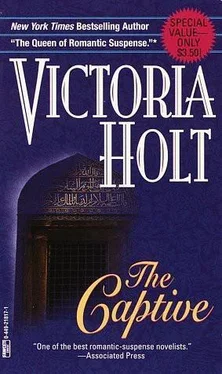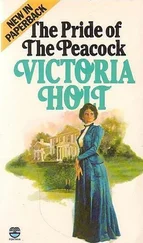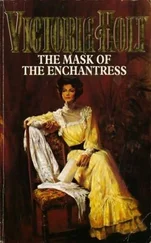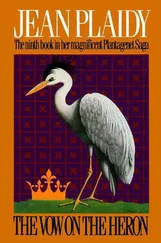Виктория Холт - The Captive
Здесь есть возможность читать онлайн «Виктория Холт - The Captive» весь текст электронной книги совершенно бесплатно (целиком полную версию без сокращений). В некоторых случаях можно слушать аудио, скачать через торрент в формате fb2 и присутствует краткое содержание. Жанр: Историческая проза, на английском языке. Описание произведения, (предисловие) а так же отзывы посетителей доступны на портале библиотеки ЛибКат.
- Название:The Captive
- Автор:
- Жанр:
- Год:неизвестен
- ISBN:нет данных
- Рейтинг книги:5 / 5. Голосов: 1
-
Избранное:Добавить в избранное
- Отзывы:
-
Ваша оценка:
- 100
- 1
- 2
- 3
- 4
- 5
The Captive: краткое содержание, описание и аннотация
Предлагаем к чтению аннотацию, описание, краткое содержание или предисловие (зависит от того, что написал сам автор книги «The Captive»). Если вы не нашли необходимую информацию о книге — напишите в комментариях, мы постараемся отыскать её.
The Captive — читать онлайн бесплатно полную книгу (весь текст) целиком
Ниже представлен текст книги, разбитый по страницам. Система сохранения места последней прочитанной страницы, позволяет с удобством читать онлайн бесплатно книгу «The Captive», без необходимости каждый раз заново искать на чём Вы остановились. Поставьте закладку, и сможете в любой момент перейти на страницу, на которой закончили чтение.
Интервал:
Закладка:
He paused for a moment and, pointing to the kitchen stove, said:
“There on a bank … enjoying every minute, seeing each brother prepared to kill the other for her sake, sat the cause of the trouble.”
The kitchen stove became a bank. I could see the girl, looking a little like Felicity, only Felicity was too good and kind to want anyone to die for her. It was all so vivid; and that was how it always was with Mr. Dolland’s turns.
He made a dramatic thrust and went on in hollow tones:
“Just as one brother caught the other in the neck, severing a vein, the other struck his brother through the heart. So … both brothers died on Long Fields as it was called then, though afterwards the name was changed to Southampton Fields.”
“Well, I never,” said Mrs. Harlow.
“The things people do for love.”
“Which one haunted her?” I asked.
“You and your ghosts,” said Nanny disapprovingly.
“There always has to be a ghost for this one.”
“Listen to this,” said Mr. Dolland.
“While they were going back and forth’ he did a little more swordplay to illustrate his meaning ‘they made forty steps on that bloodstained patch and where those brothers had trod nothing would ever grow again. People used to go out and look at them. According to my granny, they could see the footsteps clearly and the earth was red as though stained with blood. Nobody ever went there after dark.”
“They didn’t before,” I reminded him.
“But the highwaymen didn’t go there either … and still nobody went.”
“Did they see anything?” asked Dot.
“No. There was just this brooding feeling of something not quite natural. They said that when it rained and the ground was soggy you could still see the footsteps and they were tinged with red. Things were planted but nothing would grow. The footsteps remained.”
“What happened to the girl for whom they fought?” asked Felicity.
“She fades out of the story.”
“I hope they haunted her,” I said.
“They shouldn’t have been such fools,” said Nanny.
“I’ve no patience with fools. Never have had, never will have.”
“It’s rather sad, I think, that they both died,” I commented.
“It would have been better if one of them had remained to suffer remorse . and the girl wasn’t worth all that trouble anyway.”
“You have to accept what is,” Felicity told me.
“You can’t change life to make a neat ending.”
Mr. Dolland went on: “There was a play written about it. It was called The Field of the Forty Steps.”
“Were you in it, Mr. Dolland?” asked Dot.
“No. A bit before my day. I heard of it though, and it made me interested in the story of the brothers. Somebody called Mayhew wrote it with his brother, which was a nice touch … brothers writing about brothers, so to speak. They played it at the theatre in Tottenham Street. It ran for quite a while.”
“Fancy all that happening round here,” said Emily.
“Well, we never know what’s going to happen to any of us at any time,” commented Felicity seriously.
So the time passed, weeks merging into months and months into years.
Happy, unruffled days with little to disturb our serenity. I was approaching my twelfth birthday. I suppose Felicity would have been about twenty-four then. Mr. Dolland was greying at the temples which we declared made him look very distinguished and that added a certain grandeur to his turns. Nanny complained more of her rheumatics and Dot left to get married. We missed her, but Meg took her place and Emily Meg’s and it was thought unnecessary to engage a new twee ny In time Dot produced a beautiful fat baby whom she proudly brought round for us all to see.
There were many happy memories in those days; but I should have realized that they could not go on for ever.
I was growing out of childhood and Felicity had become a beautiful young woman.
Change comes about in the most insidious way.
There had been the odd occasion since Felicity had come to us when she had been invited to join one of the dinner parties given by my parents. Of course, Felicity explained to me, it was because they needed another female to balance the sexes, and as she was the niece of Professor Wills she was a suitable guest, although only the governess. She did not look forward to these occasions. I remember the one dinner dress she had. It was made of black lace and she looked very pretty in it, but it hung in her wardrobe a depressing reminder of the dinner parties which were the only occasions when she wore it.
She was always thankful when my parents went away for the reason that there could be no invitations to dinner parties. She was never sure when they would be forced on her, for to invite her was generally a last-minute decision. She was, as she said, a most reluctant makeshift.
As I grew older I saw a little more of my parents. I would take tea with them at certain times. I believe they felt even more embarrassed in my presence than I did in theirs. They were never unkind. They asked a great many questions about what I was learning and, as I had an aptitude for gathering facts and a fondness for literature, I was able to give a fair account of myself. So although they were not particularly elated by my progress, nor were they as displeased as they might have been.
Then the first signs of the change began, although I did not recognize them as such at the time.
There was to be a dinner party and Felicity was summoned to attend.
“My dress is getting that tired and dusty look which black gets,” she told me.
“You look very nice in it, Felicity,” I assured her.
“I feel so … apart… the outsider. Everyone knows I’m the governess called in to make up the numbers.”
“Well, you look nicer than any of them and you’re more interesting, too.”
That made her laugh.
“All those deedy old professors think I’m a frivolous empty-headed idiot.”
“They are the empty-headed idiots,” I said.
I was with her when she dressed. Her lovely hair was piled high on her head and her nervousness had put a becoming touch of pink into her cheeks.
“You look lovely,” I told her.
“They’ll all be envious.”
That made her laugh again and I was pleased to have lightened her mood a little.
The awesome thought struck me: soon I shall have to go to those boring dinner parties.
She came to my room at eleven that night. I had never seen her look so beautiful. I sat up in bed. She was laughing.
“Oh, Rosetta, I had to tell you.”
“Shh,” I said.
“Nanny Pollock will hear. She’ll say you ought not to disturb my slumbers.”
We giggled and she sat on the edge of my bed.
“It was such … fun.”
“What?” I cried.
“Dinner with the old professors … fun!”
“They weren’t all old. There was one …”
“Yes?”
“He was quite interesting. After dinner …”
“I know,” I broke in.
“The ladies leave the gentlemen to sit over the port to discuss matters which are too weighty or too indelicate for female ears.”
We were laughing again.
“Tell me more about this not-so-old professor,” I said.
“I didn’t know there were such things. I thought they were all born old.”
“Learning can sit lightly on some.”
There was a radiance about her, I noticed then.
“I never thought to see you enjoy a dinner party,” I said.
“You give me hope. It has occurred to me that one day I shall be expected to attend them.”
“It depends on who is there,” she said, smiling to herself.
“You haven’t told me about the young man.”
“Well, he was about thirty, I should say.”
“Oh, not so young.”
Читать дальшеИнтервал:
Закладка:
Похожие книги на «The Captive»
Представляем Вашему вниманию похожие книги на «The Captive» списком для выбора. Мы отобрали схожую по названию и смыслу литературу в надежде предоставить читателям больше вариантов отыскать новые, интересные, ещё непрочитанные произведения.
Обсуждение, отзывы о книге «The Captive» и просто собственные мнения читателей. Оставьте ваши комментарии, напишите, что Вы думаете о произведении, его смысле или главных героях. Укажите что конкретно понравилось, а что нет, и почему Вы так считаете.








